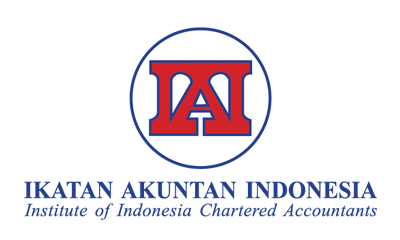Studi Corporate Information Transparency On The Internet (e-CTI) Pada Bursa Efek Indonesia, Malaysia, Dan Thailand
Abstract
Keywords
Full Text:
PDFReferences
Abdillah, M. R. (2015). Pengaruh Karakteristik Dewan Komisaris Terhadap Pengungkapan Internet Financial Reporting (IFR). Dinamika Ekonomi Jurnal Ekonomi dan Bisnis, 8(1), 53-70.
Agoes, S., & Ardana, I. C. (2014). Etika Bisnis dan Profesi. Jakarta: Salemba Empat.
Akhtaruddin, M., Hossain, M. A., Hossain, M., & Yao, L. (2009). Corporate Governance and Voluntary Disclosure in Corporate Annual Report of Malaysian Listed Firms. Journal of Applied Management Accounting and Research, 7(1), 1-20.
Almilia, L. S. (2008). Faktor-Faktor Yang Memengaruhi Pengungkapan Sukarela “Internet Financial and Sustainability Reportingâ€. Jurnal Akuntansi dan Auditing Indonesia, 12(2), 117-131.
Anggraita, V. F., & Syafuqurrahman, M. (2013). Transparansi Informasi Perusahaan Berbasis Internet (e-CTI) pada Perusahaan Yang Terdaftar di China (SSE50), India (NIFTY), dan Indonesia (LQ45). Simposium Nasional Akuntansi XVI, 514-538.
Askary, S., Punder, J. S., & Yazdifar, H. (2008). Influence of Culture on Accounting Uniformity Among Arabic Nations. Education, Business ,and Society: Contemporary Middle Eastern Issues, 1(2), 145-154.
Boediono. (1985). Teori Pertumbuhan Ekonomi. Yogyakarta: BPFE.
Campbell, J. L. (2006). Institutional Analysis and The Paradox of Corporate Social Responsibility. American Behavioral Scientist, 49(7), 925-938.
Fikrisani, M., & Cahyonowati, N. (2015). Analisis Faktor Yang Mempengaruhi Tingkat Pengungkapan Internet Corporate Reporting. Diponegoro Journal of Accounting, 4(3), 1-10.
Freeman, R. E. (1984). Strategic Management: A Stakeholder Approach. Boston: Pitman.
Friedman, M. L. (1969). The Legal System: a Social Science Perspective. New York: Russel Soge Foundation.
Gandia, J. L. (2008). Determinants of Internet – Based Corporate Governance Disclosure by Spanish Listed Companies. Online Information Review, 32(6), 791-817.
Giam, S. H., & Breliastiti, R. (2015). Pengaruh Ukuran Perusahaan, Leverage, Dan Tipe Industri Terhadap Corporate Information Transparency On The Internet (e-CTI) Perusahaan LQ45. Jurnal Akuntansi Bisnis, 8(2), 1-31.
Harsono, M. (2002). Prosedur Pengujian Variabel Kontrol dan Moderator Dalam Penelitian Perilaku Dengan Menggunakan SPSS 10.00. Surakarta: Universitas Sebelas Maret.
Hofstede, G., Hofstede, G. j., & Minkov, M. (2010). Cultures and Organizations: Software of the Mind. New York: Mc Graw Hill.
Holthausen, R. W. (2009). Accounting Standards, Financial Reporting Outcomes, and Enforcement. Journal of Accounting Research, 47(2), 447-458.
IAI. (2016). Exposure Draft Kerangka Konseptual Pelaporan Keuangan. Jakarta: Dewan Standar Akuntansi Keuangan Ikatan Akuntan Indonesia.
Jaggi, B., & Low, P. (2000). Impact of Culture, Market Forces, and Legal System on Financial Disclosures. The International Journal of Accounting, 35(4), 495-519.
Kasmir. (2012). Analisis Laporan Keuangan. Jakarta: Raja Grafindo.
Kieso, E., Weygandt, J. J., & Warfield, T. D. (2017). Akuntansi Keuangan Menengah (Intermediate Accounting) (Edisi IFRS). Jakarta: Salemba Empat.
Lington, R. (1984). Antropologi: Suatu Penyelidikan Tentang Manusia. Bandung: Jemars.
Mohammadi, S., & Nezhad, B. M. (2015). The Role of Disclosure and Transparency in Financial Reporting. International Journal of Accounting and Economics Studies, 3(1), 60-62.
Munawir, S. (2015). Analisis Laporan Keuangan. Jakarta: Salemba Empat.
Nur, E. M. (2012). Konsumsi dan Inflasi Indonesia. Jurnal Kaijan Ekonomi, 1(1), 55-77.
Ojah, K., & Mokoteli, T. M. (2012). Internet Financial Reporting, Infrastructures and Corporate Governance: An International Analysis. Review of Development Finance, 2(2), 69-83.
Ousama, A. A., & Fatimah, A. H. (2010). Factors Influencing Voluntary Disclosure: Empirical Evidence from Shariah Approved Companies. Malaysian Accounting Review, 9(1), 85-103.
Puspitaningrum, D., & Atmini, S. (2012). Corporate Governance Mechanism and the Level of Internet Financial Reporting: Evidence from Indonesian Companies. Procedia Economics and Finance, 2, 157-166.
Sadorno, S. (2013). Teori Pengantar: Makroekonomi. Jakarta: PT Raja Grafindo Persada.
Samaha, K., & Abdallah, S. (2011). Further Evidence on Web-based Corporate Dosclosures in Developed Versus Developing Countries: A Comparative Analysis of Nature and Determinants in Egypt and The United Kingdom. International Journal of Disclosure and Governance, 9(2), 148-180.
Samaha, K., & Dahawy, K. (2010). An Empirical Analysis of Corporate Governance Structures and Voluntary Corporate Disclosure in Volatile Capital Markets: The Egyptian Experience. International Journal of Accounting. Auditing and Performace Evaluation, 7(1/2), 61-93.
Schumpeter, J. (1934). The Theory of Economic Development. An Inquiry into Profits, Capital, Credit, Interest and the Business Cycle. USA: Harvard.
Soemarso. (2003). Akuntansi Suatu Pengantar (Pertama ed.). Jakarta: Salemba Empat.
Suwardjono. (2014). Teori Akuntansi: Perekayasaan Pelaporan Keuangan (Ketiga ed., Vol. Kedelapan). Yogyakarta: BPFE Yogyakarta.
Turrent, G. B., & Ariza, L. R. (2012). Corporate Information Transparency on the Internet by Listed Companies in Spain (IBEX35) and Mexico (IPYC). The International, 12, 1-37.
Utomo, B. (2009). Geografi Membuka Cakrawala Dunia 3. Jakarta: Pusat Perbukuan Departemen Pendidikan Nasional.
Wiwin. (2017). Studi Corporate Information Transparency On The Internet (e-CTI) Pada Bursa Efek Thailand, Singapura, Malaysia, dan Indonesia. Jurnal Akuntansi, Manajemen, dan Bisnis Parsimonia, 3(3), 69-87.
Zarkasyi, M. W. (2008). Good Corporate Governance Pada Badan Usaha Manufaktur, Perbankan, dan Jasa Keuangan Lainnya. Bandung: Alfabeta.
https://economy.okezone.com/. (2017, September 30). Dipetik Juli 15, 2019, dari https://economy.okezone.com/read/2017/09/30/320/1786292/menko-darmin-kerjasama-indonesia-malaysia-dan-thailand-bisa-pulihkan-kondisi-ekonomi-dari-krisis.
DOI: https://doi.org/10.35591/wahana.v23i2.215
Wahana: Jurnal Ekonomi, Manajemen dan Akuntansi
ISSN : 2685-1415 (Online) | 1410-8224 (Print)
Published by Pusat Penelitian dan Pengabdian Masyarakat Politeknik YKPN Yogyakarta.
Jl. Gagak Rimang No. 2-4 Balapan, Yogyakarta 55222
Phone (0274) 560159, 562317, 513413, 563516 Fax. (0274) 561591
 This work is licensed under a Creative Commons Attribution-ShareAlike 4.0 International License.
This work is licensed under a Creative Commons Attribution-ShareAlike 4.0 International License.













